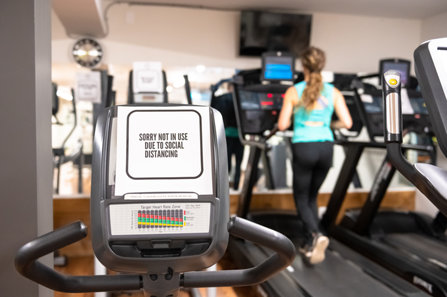Exercise – Coming Out of Quarantine and Exercising for Recovery

After sheltering at home for possibly several months, recovering addicts are perhaps wondering how best to work their way back into day-to-day life. In addition to eating well and getting lots of rest, as recovering addicts resume their daily lives in a post-COVID world, it would be wise for them to get plenty of exercise.
Why? Because exercise can reduce cravings, improve mood, increase confidence, heal bodily damage, stave off health problems, and bring on a whole list of other, positive effects.
Exercising After Sheltering at Home
Addiction is a horrific, debilitating crisis, but it is treatable. And once an individual has gotten off of drugs and alcohol, a healthy diet and regular exercise become a crucial part of his ongoing recovery process. There is much to repair, physically and mentally, after years spent using drugs and alcohol. Getting regular exercise is one thing a recovering addict can do to help facilitate that repair.

Unfortunately, for many recovering addicts, getting enough exercise has probably been pretty challenging over the past several months. Quarantine and sheltering at home hasn’t exactly lent itself to regular exercise (though some have been able to exercise at home).
Exercise is beneficial for recovering addicts for several reasons. For one, exercise helps reduce cravings. For another, exercise helps encourage healthy bodily function, improves mood, and can even lead to healthier lifestyles in general.
The mood-improving factor of exercise is especially significant since Americans have generally been quite stressed out due to the COVID-19 pandemic. For those in recovery, just the mood-improving benefits of exercise alone are enough reason to exercise regularly. Because drug use tends to deplete “feel good” neurotransmitters within the brain like glutamate, GABA, dopamine, and serotonin, getting regular exercise is an excellent way to boost those neurotransmitters and start feeling better again.
There’s also a fair amount of evidence that regular exercise can help boost immune response, an essential aspect of human health that people are more aware of now, due in part to the COVID-19 pandemic. For those in recovery who may have compromised or hindered immune systems, exercising can be a superb way to improve general health and boost immune response at the same time.
Last but not least, exercising helps inspire healthy patterns, and healthy habits tend to lead to more healthy patterns. Recovering addicts who exercise are also more likely to eat better, get plenty of rest, and engage in activities that improve their mindset and mood. Now that people can come out of their homes and start exercising again, it’s the perfect time to do so, especially after so many months cooped up in the house!
Exercising in a Safe Manner

It’s worth mentioning that getting out and exercising to improve one’s health is somewhat defeated if one does not also try to protect themselves from COVID-19 in the process. While gyms, community centers, basketball and tennis courts, parks, pools, rec centers, and running tracks are beginning to open back up again, COVID-19 is still a developing and growing pandemic.
If a recovering addict is going to exercise in a place where other individuals are exercising, it would be wise to wear a mask, practice social distancing, wear gloves, sanitize frequently, and be mindful of one’s health in general. It may be wise to avoid the gym altogether and exercise outside. If exercising outdoors is not an option, one might consider at-home exercise with the help of free workout videos online, or possibly a trip to the gym only when very few people are using the space.
There is no doubt that exercising boosts health and is an excellent way for recovering addicts to get back on their feet in a post-quarantine world. After several months of sheltering at home, one of the best things a recovering addict can do is exercise. This helps get the blood flowing and the organs and muscles working at peak condition again. That boosts immune response and helps fend off illness, and doing so improves mood, too.
However, protecting one’s health from getting sick must take priority overall. One must not risk exposure to COVID-19 just to exercise.
Addiction Treatment – What to Do if a Loved One is Using Drugs and Alcohol
While exercise has many benefits for those in recovery, getting exercise will not help someone who is currently using drugs and alcohol to suddenly cease using drugs and alcohol. Only drug and alcohol addiction treatment programs can do that.
Addiction is a powerful, compelling, controlling, and highly devastating crisis of the body and mind that pulls people in and traps them, making it nearly impossible for them to break free and seek a clean, drug-free life.
Addiction rehabilitation programs exist to help drive a wedge between an addict and his substance of choice. With the help of treatment programs, loved ones who seemed lost to their drug use can finally find freedom from drugs and alcohol once and for all.
Narconon uses proven rehabilitation technology that tackles addiction at its source. Narconon helps people address and resolve the underlying issues that caused them to turn to substances in the first place. With Narconon’s help, people can uncover and address not just the day-to-day struggles of drug use, but the often hidden and elusive source points of their addiction.
For over 50 years, Narconon has helped thousands of people break free from addiction for good. If your loved one is still struggling with a drug habit, don’t spend another minute wondering what will happen to them. Contact Narconon today to receive immediate assistance in getting your loved one into treatment.
Sources:
